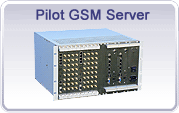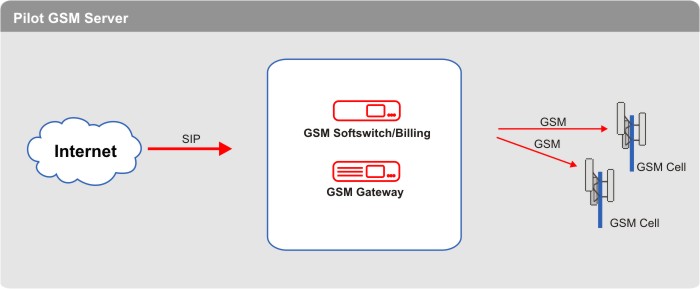Pilot GSM Server
Problem
 VOIP operation wants to expand the business into GSM call termination utilizing locally purchased SIM cards for cheaper termination rates. The available GSM termination solutions do not present reliable termination options because they do not address the main GSM termination problems such as SIM card suspension, number traps, number probes, blacklist management, and human behavior emulation.
VOIP operation wants to expand the business into GSM call termination utilizing locally purchased SIM cards for cheaper termination rates. The available GSM termination solutions do not present reliable termination options because they do not address the main GSM termination problems such as SIM card suspension, number traps, number probes, blacklist management, and human behavior emulation.
Solution
SysMaster is the first GSM solution provider that provides solution to all GSM termination problems by introducing a distributed GSM termination solution allowing VOIP providers to easily enter the GSM termination market with minimal financial risk. The solution is integrated to include GSM channels, VoIP Billing, and Softswitch Routing functionality in one GSM Pilot Server.
Return of Investment Analysis
Download Brochure here
Unique Features of the GSM Termination Solution:
- VOIP Billing and Account Management
- Distributed Locations Management
- Remote SIM Card Recharge and Balance Verification via SMS/USSD Control
- Delayed GSM Dial-out with RBT tone
- ASR Filtering based on ANI
- Cancel Timeout Call Request Filtering based on ANI
- Blacklist Management or Number Traps
- Maximum Calls per Minute Control
- Balance Depletion Rate Control per channel
- Human Usage Emulation Management
- Whitelist Management and Control
- Time-Scheduling and After-hours Call Control
- Automated Route Flagging and Blacklisting
- Human IVR Interaction to GSM Operator Agent Calls
- Inbound IVR Management to Provide IVR for Call-ins
- Maximum Useable Channel Management
- Protected Mode Support and Call Control
Pilot GSM Server Components:
The Pilot GSM Server consists of the following three components in one server.
- VOIP Billing and Account Management – used to bill and account for all calls
- GSM Termination Softswitch – used to process GSM traffic and avoid Number Traps/Pings
- GSM Gateway – used to terminate and originate GSM calls.
Pilot GSM Server overcomes the following GSM Problems:
- Destination Number Traps/PINGs
- IMEI Switching and Management
- SIM Card Sharing Among Remote GSM Modules
- GSM Call Termination Detection
- Uneven GSM Traffic Distribution
- Outbound-to-Inbound Call Ratio
- GSM Call Termination Mobility
- Automatic SIM Card Management
Destination Number Traps/PINGs
This is the most popular, quickest and undetectable method to suspend SIM cards that terminate GSM traffic. The method relies on calling specific Destination Number numbers that belong to the GSM Network operator that record the caller id (ANI) of the SIM card that terminates the GSM call. Once such a SIM card has one or more recordings of calling the Destination Number Trap numbers, it is automatically suspended in a matter of minutes. Since the GSM Network operators automatically call these numbers on frequent basis and they have a large pool of such numbers, the chances of getting a SIM card to terminate such a call within 24 hour period are over 90%. In most cases such cards are identified and suspended in less than 5 minutes. The important role of the Pilot GSM Server is to isolate such numbers (Destination Number Traps) and enter them into the Black List. This is done automatically even for a very large amount of such numbers in a matter of hours if there is a sufficient volume of traffic. Once the detection of Destination Number Traps is completed the chances of SIM card suspensions are reduced dramatically to lower than 1%.
IMEI Switching and Management
This is required to allow GSM termination providers to change the IMEI identity of their GSM termination modules. This task is highly unreliable using conventional methods, because GSM providers easily get the make/model of the GSM termination modules and match it to the IMEI database they have, and if there is any discrepancy simply flag the IMEI number. For example most GSM Gateway manufacturers, use industrial (not consumer, e.g. Siemens GSM Module) GSM modules that are known to be used in industrial equipment not mobile phones. If IMEI belonging to a Nokia GSM phone is assigned to this industrial module, the GSM provider will immediately detect the discrepancy. Using inexpensive IMEI management procedure that has consistent make/model of a consumer phone along with the low price of such consumer phone, make the Pilot GSM Server a preferred GSM termination device.
SIM Card Sharing Among Remote GSM Modules
This method is very popular among GSM termination providers but proves to be unreliable because it is easily detected. In most cases the SIM card sharing requires that the GSM module unregistered the SIM card from one GSM cell location and then immediately registers in into another GSM module location even if these two module locations are thousands of kilometers apart. The procedure is easily detectable because of the jump of the SIM card in a matter of seconds from one GSM cell location to the other and the fact that there is no roaming involved in the period of this jump. In addition, the IMEI-SIM card pairing changes in a matter of several seconds which makes the GSM network operator aware that this is a computerized switch. Using SIM Card Sharing is a technology which does not provide reliable results and allows for very simple software isolation and flagging of both the SIM card and the GSM module IMEI.
GSM Call Termination Detection
GSM network operators heavily rely on automated call detection to separate human-like GSM call termination from GSM traffic termination. The procedure requires that the operator monitors heavy volume call traffic that has calls without normal call interval between them. A common example is to make 5-6 calls in 20 seconds using the same SIM card, which obviously is not human-like behavior. The Pilot GSM Server takes care of the proper call routing and timing so all processed calls appear normal enough to prevent easy detection. The system spreads out the call volume among all available channels using pre-configured rules to guarantee that all SIM cards are exhibiting human-like call flow.
Uneven GSM Traffic Distribution
This is also a common way to identify the SIM cards that terminate GSM traffic. The Pilot GSM Server requires a larger number of SIM cards to allow proper traffic distribution. If possible it will emulate phone book calling (calling one number from one and the same SIM card every time). It will also do even call distribution among all SIM cards and call minute accounting for minute termination to different networks (in-network and out-network/roaming). In addition, the Pilot GSM Server may control which SIM cards will be used during the day, evening, and night to provide human-like behavior so that corporate cards are used mostly during the day while personal SIM cards make calls during the evening and night. All supported features are configurable.
Outbound-to-Inbound Call Ratio
This method is very popular for GSM network operators to isolate GSM termination - it is unlikely for a normal GSM subscriber to only make outbound calls but to reject all inbound calls. The GSM network operators rely on proper mixture between outbound and inbound calls, so the Pilot GSM Server must provide a solution for this problem as well. The Pilot GSM Server will accept inbound GSM calls and call-backs with an automated IVR to allow inbound call support with variable time, thus the ratio of outbound to inbound is kept within the acceptable GSM network operator limits.
GSM Call Termination Mobility
Pilot GSM Server supports the most popular 3G data modems to allow complete mobility of GSM call termination. This will resolve all mobility associated GSM provider filters. The Pilot GSM Server will provide full roaming services for both GSM voice as well as data traffic. The Pilot GSM Server requires only 60W of power and it can be supplied by any regular automobile battery for several hours (non-rechargeable mode) and indefinitely (rechargeable mode). The Pilot GSM Server can be placed inside any vehicle and fully function under all roaming conditions provided that GSM coverage exists for both voice and data traffic.
Automatic SIM Card Management
SysMaster has developed the ultimate solution for automated SIM card management to detect card balance depletion and card suspension status so that inbound GSM traffic is not routed to SIM cards that are depleted or suspended. The GSM Softswitch will track all used up minutes terminated within the network and outside the network (roaming). In addition, the GSM Softswitch will monitor in real-time the ACD associated with each card and if the ACD is outside the normal parameters will automatically remove the card from GSM termination rotation. This procedure will guarantee that all SIM cards with valid balance and active status will route GSM traffic.
Solution Implementation and Performance
SysMaster provide a complete GSM termination solution that relies of intelligent routing and creation of the White and the Black List databases. This is a unique, field-tested solution that works in the long run without the need to support frequent SIM card and GSM hardware replacement. Basically this solution will allow you to make a single investment and run your GSM termination business consistently for a long period of time. The proposed GSM Solution Implementation has two phases:
Solution Implementation and Performance
- Black List Build-Up
- Normal GSM Termination
Black List Build-Up
This is the phase that will require between several days based on the volume of traffic that the GSM termination provider is processing. It is important, however, that the GSM termination provider routes traffic form at least 3 different VOIP origination operators, so that all possible Destination Number Trap numbers are routed at least once by the GSM SofSwitch and are automatically entered into the Black List. The GSM SofSwitch will look for traffic patterns and will even identify GSM area codes that represent such Destination Number Trap numbers. The procedure will require at least 12 GSM channels (one Pilot GSM Server) so calls are properly processed and the Black List is completely built-up. The SIM Card termination period and SIM card suspension rate may vary but initially it will be high, and in a couple of days it will drop dramatically, as most of the Destination Number Traps numbers will be captured.
Normal GSM Termination
This is the phase that will allow for long-time GSM Termination without SIM card suspension. It requires the built-up of a Black and White Lists and the usage of the Pilot GSM Server to allow capturing of Destination Number Traps numbers that are newly introduced by the GSM Network Operator. There will be casual SIM cards that are suspended on the Pilot GSM Server, but it is unlikely that large number of SIM cards will be impacted once during this phase.
GSM Termination Solution Benefits
- Field-Proven and Reliable for a Long Time
- Low SIM Card Suspension Rate
- Resolves All Major GSM Termination Problems
- Inexpensive and User-Friendly Technology
Field-Proven and Reliable in a Long-Run
SysMaster offers a solution that has been field-proven and reliable for a long period of time. It is based on the usage of intelligent Pilot GSM Server that builds up White and Black List databases and routes traffic to two different types of GSM gateways, each having a different role. Once this solution is implemented it will resolve all potential problems that GSM termination providers face today.
Low SIM Card Suspension Rate
SysMaster offers a solution that will allow all SIM cards to be used for long time for GSM call termination. The implementation of the GSM termination solution will reduce the SIM card suspension rate to 1% or less in a matter of several days.
Resolves All Major GSM Termination Problems
The GSM solution resolves all major GSM termination problems such as Destination Number Traps, human call emulation, IMEI switching, etc. The solution will guarantee that it will function reliably if implemented properly for long periods of time, thus reducing initial investment and support costs.
Inexpensive and User-Friendly Technology
SysMaster has a long history of providing carrier-grade products for the VOIP industry. Now the company introduces the new and improved Pilot GSM Server. The server features user-friendly interface to allow very easy configuration and management even by users that are not technical experts. In addition, the Pilot GSM Server is the only GSM gateway product offered in the industry with the list of features required to navigate the GSM termination call flow.
Who Should use the SysMaster GSM Termination solution
Sysmaster introduces a new generation of GSM termination solution for GSM Termination providers that face technical and regulatory challenges to freely and inexpensively terminate GSM calls. If a GSM provider experiences one or more of the problems described above, they can turn to the new-generation GSM Termination solution with confidence to achieve unsurpassed GSM call termination performance and reliability of the termination call flow.








 Class 4 Service
Class 4 Service 














